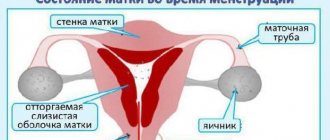There are many different opinions on this topic. Some clergy say that you can go to church during your period. But most of them claim that this is prohibited. Many women are interested in knowing at what time during menstruation they can attend church, and whether it is possible at all. Much has changed since the times of the Old Testament; now almost no one blames a woman for the presence of such a natural process as regula. But many churches have restrictions and rules of behavior for women who decide to attend church during menstruation.
Is it possible to attend church during menstruation?
Among the majority of parishioners, there are certain generally accepted rules, according to which women can attend church and pray on days of so-called uncleanness, but touching shrines (the Cross, the Gospel, the relics of saints) and participating in the Sacraments is prohibited.
There are only 7 sacraments:
- Baptism;
- Confirmation;
- Repentance;
- Communion;
- Sacrament of marriage (wedding);
- Blessing of Unction;
- Priesthood (applies only to clergy, women do not participate in it).
Previously, women were prohibited from entering God’s temple at all on days of any uncleanness (menstruation, the first 40 days after childbirth).
This was due to the fact that, due to the nature of the clothing, menstrual blood could drip onto the floor and thereby desecrate the shrine.
Nowadays, thanks to the huge number of hygiene products, such situations are impossible, so women are allowed to go to church.
Nevertheless, even now it is traditionally advised to stand during services not in the temple itself, but in the vestibule; if it’s not there, which is possible, then it’s just not far from the entrance.
Is it possible to receive communion during menstruation? Your personal confessor will tell you. You should listen to him.
The table shows in more detail the permissions and prohibitions regarding critical days.
| What can you do during your period? | What is prohibited |
| Pray | Participate in the Sacraments (whether to receive communion, get married - any) |
| Light candles | Venerate to icons, relics, the Cross |
| Take a blessing from the priest | Take prosphora, antidor, holy water |
| Sing in the choir | Take a dip in the holy spring |
Note! It is forbidden to enter the temple with any bleeding wound, so as not to desecrate it by shedding blood.
How they think now - New Testament
At the moment, there is no strict ban on visiting the temple on critical days. The shedding of human blood is prohibited in churches, but menstruation no longer applies to this. An example can be given: if a person is injured while in the temple, then it is necessary to immediately leave, as this is considered desecration of shrines. Women are allowed to be in the temple, but be sure to remember to use reliable personal hygiene products. With their use, it can be assumed that bleeding does not occur.
Temples are considered a holy place, so some behavior of girls during the regul is unacceptable. On this issue, the clergy do not agree on a single opinion. Some of them believe that during this period all rituals are prohibited for women, as well as touching icons and all church paraphernalia. Others argue that the restrictions are minimal. Almost all priests currently prohibit such rites as Baptism and Wedding. It is recommended to wait until the end of menstruation and only then go to church. They do not prohibit praying or lighting candles. Some allow Communion during menstrual periods, especially when a woman especially needs it. For example, if there is a serious illness.
Many clergy adhere to modern views and believe that menstruation is a natural biological process that should not interfere with a girl if she wants to attend church.
If in the times of the Old Testament it was strictly forbidden to come to church, perform rituals, pray, and also touch icons, now these rules have changed enormously. It has become more often mentioned that the girl is not to blame for such a process as the menstrual cycle, because it is explained by physiology. This allows her not to feel guilty. The modern church does not blame a woman for the fact that the pregnancy did not take place. Most clergy do not consider girls “unclean” on critical days, which means that their appearance in the temple does not desecrate the shrines in any way.
Communion during menstruation: canons of the Old Testament
Is it possible to receive communion during menstruation? The Old Testament says unequivocally: “No!”
In those days, a woman could not enter the temple at all during the period of purification. And this was connected not only with hygienic features, but also with a spiritual component.
It was believed that menstruation is, firstly, a reminder of damaged human nature, and secondly, it is an unborn child , that is, a “dead body”, which also desecrated the shrine.
In addition, anyone who touched a woman during her menstrual period also became “unclean.”
This is interesting! Even about the Virgin Mary in the Protoevangelium of James it is said that she lived in the temple until she was 12 years old, and then, after her betrothal, she was sent to live with Joseph so that the “sanctuary of the Lord” could not be desecrated.
Read the popular article in the category: Impressive weight loss with Turboslim Alfa. Reviews and results of those who have lost weight.
Is it possible to go to church while on your period? Is it allowed to go?
Almost every woman knows that during menstruation one should not come to a sacred place - this strict rule is passed down from generation to generation, from mouth to mouth. Some strictly observe this prohibition, while others are indignant and express their indignation, reflecting on why such a church law was formed.
Still others, without taking this into account, visit the temple regardless of the condition of their body. So is it permissible to visit a sacred place during menstrual flow? Where did this rule come from and why? We will try to figure this out.
What the New Testament says about going to church with your period
The words of the Apostle Paul, found in the New Testament, assure us that everything God creates is beautiful. The processes that the human body is endowed with are completely natural. Menstruation is an important sign of a healthy woman's body.
It plays a significant role, which influences the pointlessness of the ban on visiting the church during this period. St. George Dvoeslov was also a supporter of this. According to him, a woman with her processes is the embodiment of natural design, so there is no point in prohibiting her from going to temple during the period of menstrual flow.
The main thing has always been and is the soul, the spiritual state.
Menstruation is no longer considered unclean; it is recognized as a process that God created . In turn, the New Testament refers to the consumption of foods during meals that are prohibited by the Torah as uncleanness, which is unacceptable for the Jewish people. Pork is also considered unclean food.
Another issue that the first Christian women faced was the permissibility of communion during menstruation. Their behavior depended on their choices. Some, taking into account traditions and canons, did not touch anything sacred, while others were of the opinion that only sin could separate them from the love of the Lord.
Also in the New Testament you can find a story about how a woman during her menstrual bleeding touched God’s clothing and was healed. But the Lord did not reject it, but with acceptance said that everything that nature created was given by God, and therefore is natural.
The attitude of the early church and the holy fathers of that time to the issue of menstruation
When the new belief emerged, this period was characterized by a lack of clear concepts in both Christianity and Judaism. The apostles no longer discussed the issue of ritual impurity. Some of them (Methodius of Olympus, Origen, the Martyr Justin) continued to believe that uncleanness is a sin. This also applied to women during menstrual bleeding.
Origen expressed his opinion about the impurity of not only menstrual flow, but also carnal pleasures. They ignored the words of the Lord that two, when they copulate, are transformed into one body (Matt. 19:5). However, his beliefs were not confirmed by the New Testament.
Saint Clement in his Apostolic Constitutions advocated that menstruation should not affect anything. He recognized the birth of a child, bleeding and bodily defects as absolutely natural things. In his opinion, various prohibitions were invented by stupid people.
Saint Gregory the Dvoeslov also supported this position.
Later, this topic became the subject of discussion at the Gangra Council. As a result, all processes that occur in the body of women were recognized as natural.
In the sixth century, Gregory the Great, Pope of Rome, joined this position.
In his letter to St. Augustine of Canterbury, who raised the topic of menstruation, he indicated that these processes are not the fault of women, therefore Christian women have the right to perform various church rituals.
This teaching remained relevant until the seventeenth century, until it was again replaced by a ban on visiting the temple on the days of menstrual bleeding.
The Russian Church of the early period - what they think about going to church with menstruation
The Russian Orthodox Church quite often put forward strict rules that related to menstruation in women or other types of discharge. The question of whether it was possible to go to church on the days of bleeding did not even arise. There was a categorical negative answer to this.
In addition, as Niphon of Novgorod emphasized, the church accepted the status of “defiled” if a child began to be born in the temple. In this case, the church is subject to sealing for three days, re-consecration and reading of a special prayer, which can be found by reading the “Question of Kirik”.
The people who were present in the temple at that moment and observed this process became unclean. In order to remove this status from oneself, it was necessary to undergo purification with the help of the prayer of the Trebnik.
If a woman entered the church without menstruation, and she began to have menstruation while she was present in a sacred place, she should leave there as soon as possible. If she did not leave the temple, then a six-month penance awaited her.
Nowadays, the cleansing prayers of the Trebnik can also be heard in churches as a sign that a child has been born.
New Testament on Communion During Menstruation
In the New Testament, Jesus Christ changes the understanding of human purity and impurity. He talks about the importance of spirituality, the presence of the Holy Spirit, rather than physical condition.
He did not reject the bleeding woman who touched him, but, on the contrary, healed her, praising her for her faith. By this, the Savior made it clear that only what is important is what is in a person’s heart: his thoughts and intentions, and only unrighteous thoughts and actions, but not natural bodily things, can defile him.
The Apostle Paul also says that “every creation of God is good” and there is nothing unclean in man created by the Lord.
However, when he mentioned this, he meant food, so it is difficult to understand whether the apostle only wanted to talk about food or whether he was talking about all the phenomena and things created by God.
Although the concept of ritual impurity (identified in the Old Testament) has been removed, it is difficult to draw an exact conclusion about what women should do on such days. It is known that the early Christians took communion every week, and there is no mention of exceptions for women with certain disabilities.
Despite indirect indications, nowhere in the New Testament does it clearly say whether it is possible to receive communion during menstruation.
Is it possible to receive communion during menstruation - the meaning of the sacrament, prohibitions and prejudices
Issues of religion are always discussed by all generations, by every inhabitant of the planet. So many people, so many opinions. The priests are not unanimous on some issues. Is it possible to receive communion during menstruation? The main question that worries women so much.
Sacrament of Communion
History goes back to the distant past, to the time of Jesus Christ. The entire procedure of communion is described repeatedly in the Bible in the New Testament. On the eve of the great holiday of Easter, the Last Supper of Jesus Christ and his disciples - the 12 apostles - took place.
The teacher broke off a piece of bread to everyone and handed it to them with the words: “Eat, this is my body!” Then he took a sip of wine from a glass, passed it to the students, and they did the same in turn. Jesus said: “Drink, this is my blood!” For this, the royal soldiers came for Christ, and subsequently committed crucifixion.
What does this procedure mean, what meaning did Jesus put into these words? Some view it materially, others spiritually. This is the crux of the disagreement.
Communion itself signifies unity with Jesus Christ. Everyone eats his body, drinks his blood, whoever touches him. In material terms, they bake bread, prepare wine, and eat it all in turn. Where is the highest? Where is God? “Bread” and “body” signify the teachings of Jesus Christ. “Eat” means read the Bible, follow Christ.
"Wine" means faith. Without faith in the power of Jesus Christ, the Most High God, eating baked goods and drinks makes no sense. Not a word is mentioned in this place about the ban on the sacrament of communion for women with menstruation.
If everything is considered physically, women generally do not have the right to receive communion, since only men were present at the Last Supper.
Is it possible to go to confession during menstruation?
One of the conditions for proper communion according to the Christian faith is the need to confess. Easter is approaching, and your period is just around the corner. What to do in this case? This issue is also approached in different ways. Some go to church because the law of the church requires it. Others at the call of the soul.
If this is the second case, it doesn’t matter whether you have your period or not. For God, the flesh itself is considered unclean. Men and women are equally unclean. God pays attention to the inner world of a person, his thoughts, desires, aspirations. You can confess both on the first day and on the last day of your period! Cleansing occurs spiritually.
If tradition is carried out blindly, there is absolutely no power in it.
Is it possible to go to church during menstruation?
Most people are confused by the fact that women were prohibited from entering the church while on their period. Moreover, she was forbidden to appear in public places. And again Jesus Christ abolished this rule. He made men and women equal. Because for him the main thing is the soul, and it has no appearance.
One case confirms this. What is described in the Bible in the New Testament. A woman suffering from bleeding followed Christ in a crowd of people. She secretly touched his robes, contrary to all prohibitions and traditions, with the hope of being healed. Jesus felt his strength drain away.
Then he turned to the woman and said: “What are you violating? Why did you approach me while bleeding? And a second later he added: Your faith saved you!” Since then, the woman has recovered and the bleeding has stopped. You can go to church during your period if there is a spiritual or physical need for it.
And the church prohibitions of some ministers are based on the canons that were actually written. If you go to church to a priest, follow his rules, if you go to God, you must follow the scriptures of the Bible. There is no other true document in religion. All the rest are written by people and everyone has their own opinion.
You can go to church on any day of the cycle.
On what day after menstruation can you take communion?
The tradition is observed by Christians all over the world. It should be remembered that the cleansing of the body occurs after the cleansing of the soul. You can go to church during your period. It is necessary to receive communion at the call of the soul with an understanding of everything that is happening. Simply eating bread will not lead to cleansing.
It is absolutely inappropriate to ask whether this can be done on the 7th day. Examining further the scriptures of the Bible, one can notice that the “church” is faith, and the “temple” is located inside every person - in the soul. As a matter of fact, to receive communion it is not at all necessary to go to a building built by people.
At one of his sermons, he said: “A temple built by people can be destroyed in one day, but a temple built by God cannot be destroyed forever!” Jesus held the Last Supper, mind you, in an ordinary room. The main thing is to understand why all this is being done.
Some people, after the tradition of taking communion in church, remain with the same “dirty” thoughts and deeds as before. Menstruation has absolutely nothing to do with it.
Of course, many are interested in the priest’s answer. It's no secret that priests are different. And at a certain moment they also emphasize that father is also a human being. Opinions vary. Some priests insist on the ban, others do not see anything wrong with a woman visiting church during menstruation.
Source: https://moimesyachnye.ru/mozhno-li-prichashhatsya-pri-mesyachnyh.html
What the Book of Rules of the Orthodox Church says about communion during menstruation
The Book of Rules has more precise instructions regarding communion during menstruation.
It says: “A woman who is in purification should not receive communion until she is cleansed.”
However, this provision is only a reference to the authoritative opinions of the holy fathers: Dionysius, Athanasius and Timothy of Alexandria. In particular, at St. Dionysius was told that it is unlikely that a pious woman herself would dare to accept a shrine on such days.
In the Russian Orthodox Church of the 12th century, the rules were much stricter and the restrictions were very precise. Thus, if a woman began to menstruate while she was in the temple, she immediately had to leave it.
Otherwise, she received penance for a 6-month fast with daily prostrations (50 per day).
Confess in a Christian temple during menstruation
Many Orthodox girls and women are concerned about whether it is possible to go to church while on their period, take communion and confess, whether this is a violation of the canons. Sometimes there are situations when you really need to visit a temple, an important ritual for the family is scheduled, on Easter or another significant holiday.
What to do in such a situation? Skip the service or still not pay attention to critical days. Christian women and clergy have been asking this question for many centuries. They often look for the answer on their own in the Bible or the sayings of saints.
Is it possible to receive communion during menstruation: the opinion of modern priests
As for modern priests, the opinions here are completely opposite.
There are priests who require their parishioners to strictly follow all the rules of preparation for Communion (reading the canons, fasting, etc.) and do not allow women to attend during their periods.
There are those who say that the main thing is to approach the Sacrament with trepidation and real repentance, and consider all formalities (including preparation and physical condition) unnecessary.
Although, undoubtedly, there are much fewer supporters of the second point of view. Basically, most clergy adhere to the traditional approach , that is, they still do not recommend that women approach the Holy Chalice on days of cleansing.
Nevertheless, today's priests do not just use this dogma, but try to find an explanation.
And among the opinions, in addition to the common interpretations about the hygienic and spiritual side of the issue, there is also the idea that women during this period of the cycle are more tired and less collected , cannot fully pray and participate in the Liturgy and are not well enough prepared for Communion.
At the same time, there are clergy who are of the opinion that during menstruation a woman, on the contrary, needs communion more, because this period is already quite difficult for her both physically and emotionally.
Note! The question of whether it is possible to receive communion during menstruation, as well as all other restrictions and permissions, should be decided by each woman only personally with her confessor (or the priest of the temple she regularly visits).
Is it possible to go to church while on your period?
"Save me, God!". Thank you for visiting our website, before you start studying the information, please subscribe to our Orthodox community on Instagram, Lord, Save and Preserve † – https://www.instagram.com/spasi.gospodi/. The community has more than 60,000 subscribers.
There are many of us like-minded people and we are growing quickly, we post prayers, sayings of saints, prayer requests, and timely post useful information about holidays and Orthodox events... Subscribe. Guardian Angel to you!
Today, very often clergy answer the question of why you can’t go to church while on your period. This question concerns all women who enter the church. But each priest can answer it differently. Therefore, it is worth understanding where the ban on menstruating women from entering the church came from.
Is it possible to go to church while on your period, Old Testament
To consider the problem of whether it is possible to go to church with menstruation, you need to use the Old Testament. This section of the Bible clearly states in what state one should refrain from visiting a holy place, this is:
- death;
- serious illness;
- "uncleanness" of women or men.
The uncleanness of a woman is associated with certain discharges, during which the woman should not touch anything. There is an opinion. that the presence of menstruation in women is a punishment for the sinful fall of the ancestor of all living Eve. And, as you know, clergy try to protect the church and parishioners from any things that remind of man’s sinfulness and mortality.
It is also believed that menstruation is the process of ridding the body of a dead egg, a kind of death of an immature embryo. And the presence of deadly objects in the temple is prohibited.
But some experts of the Holy Book interpret this opinion somewhat differently. It is believed that the difficult process of childbirth is a punishment, but the presence of menstruation is an opportunity to continue the human race.
Thus, the Old Testament does not give a clear answer to this question.
Is it possible to go to church while on your period, New Testament
In the New Testament there are the words of the Apostle Paul, who was convinced that everything that the Lord created was beautiful. All processes that occur in the human body are natural. Menstruation is a very important period of time for the female body. Their role is quite large, so it makes no sense to prohibit people from entering the temple with them.
Saint George Dvoeslov had the same opinion. He argued that such a woman was created by nature and she should be allowed to enter the church in any state of her body. After all, the main thing is the soul, the spiritual state.
The best article for you, go to: Artos in Orthodoxy, what is it?
Take your period to church, the modern opinion of the clergy
Based on the above, it can be argued that when asked whether it is possible to go to church with menstruation, the priest’s answer may be different. There is no clear permission or prohibition in the Bible for a woman with such processes in the body to visit the temple. Therefore, you need to rely only on the answer of the sacred father.
Some clergy allow women to enter the church, but prohibit touching icons and lighting candles. You can only calmly pray and leave.
But there are times when a priest simply cannot refuse to help a person. For example, when a seriously ill woman who has uterine bleeding feels her speedy departure and wants to confess and take communion. In this case, the priest cannot refuse entry into the sacred place, although the woman is considered “unclean.”
Among the prohibitions for women during menstruation are certain church rituals:
- participle;
- baptism;
- wedding.
The most important prohibition is getting blood on holy books, candles and icons. But with today's hygiene products, these troubles can be easily avoided.
Thus, a definite answer to the question of a woman’s “uncleanness” can be debated for a very long time. Everyone has the right to act as they see fit, for each of us will stand before the Lord and answer for all our actions. Most often, priests react positively to the presence of a menstruating woman in the temple, but there are still fans of the old rules.
Therefore, before going to church, it is still advisable to clarify this issue with the priest and receive a blessing.
The Lord is always with you!
Also watch the priest’s video answer to the question whether menstruating women can attend church:
Source: https://ikona-i-molitva.info/mozhno-li-s-mesyachnymi-xodit-v-cerkov/
Communion during menstruation: the opinion of the West and the East
Regarding communion during menstruation, the holy fathers of the West and East also have different opinions.
The point of view of Western bishops - St. Clement of Rome and Gregory the Dvoeslov is such that a woman is allowed to take part in the Sacrament on such days, because this weakness does not depend on her will, and the Holy Spirit is always present in her.
However, Gregory Dvoeslov says that if the woman herself does not dare to approach Communion, then she should be praised for her piety.
In the East there is no such unanimity:
- The ancient Christian document Didascalia (3rd century) says that women can always receive communion, regardless of temporary weakness.
- During the same period, St. Dionysius of Alexandria says that a woman herself cannot dare to take Communion during the period of purification. He cites as an example the Gospel story about a woman with bleeding, who, for the sake of healing, decided to touch not the Lord himself, but only the hem of his robe.
- A little later St. Athanasius of Alexandria, discussing whether a woman can receive communion during her period, writes that just as any person cannot be blamed for the flow of saliva or phlegm from the nose, so a woman cannot be blamed for monthly flows, and defilement can only come from committing a sin.
- Timothy of Alexandria believes that a woman “should postpone Communion until she is cleansed.”
- Patriarch Pavel of Serbia allows a woman to live a full church life (light candles, pray, participate in divine services), but, in his opinion, it is still impossible to receive communion and be baptized during menstruation.
Communion and Baptism
The first rite symbolizes the unity of a simple person with the Son of God, who, before the suffering that was to come to him, as his own flesh and blood, shared bread and wine with his disciples. Communion is a beautiful sacrament, which is strictly prohibited during menstruation. The only thing is that if a woman is seriously suffering from an illness associated with severe bleeding, which happens with tumors, fibroids, etc., then she is allowed, but she must be physically as clean as possible given her serious condition.
Those suffering must definitely warn the priest about their situation. The first prayer will always be for health. Before her, the sick confess and receive communion.
If the onset of menstruation unexpectedly occurs earlier than usual, then it is better to postpone a planned event, such as baptism. If this happened to the mother, she is not allowed into the temple, but the baby is still baptized.
The attitude of the early church and the holy fathers of that time to the issue of menstruation
With the advent of the new belief, there were no clear concepts either in Christianity or in Judaism. The apostles separated themselves from the teachings of Moses, without denying the inspiration of the Old Testament. At the same time, ritual impurity was practically not an object of discussion.
The holy fathers of the early church, such as Methodius of Olympus, Origen, and the Martyr Justin, treated the issue of purity as a concept of sin. Unclean, according to their concepts, means sinful, this applied to women during menstruation.
Origen considered not only menstruation, but also sexual intercourse to be unclean. He ignored Jesus' words that when two people copulate they become one body. (Matthew 19:5). His stoicism and asceticism were not confirmed in the New Testament.
The Antiochian doctrine of the third century put the teachings of the Levites under prohibition. The Didascalia, on the contrary, denounces Christian women who abandoned the Holy Spirit during menstruation, separating the body from church services. The church fathers of that time considered the same bleeding patient to be the basis for their exhortation.
Clementius of Rome gave an answer to the problem - is it possible to go to church during menstruation, arguing that if a person who stops attending the Liturgy or receiving communion has left the Holy Spirit.
A Christian woman who has not crossed the threshold of the temple during menstruation, who has not touched the Bible, can die without the Holy Spirit, and what then? Saint Clement in the “Apostolic Constitutions” argued that neither the birth of a child, nor critical days, nor wet dreams defile a person and cannot separate him from the Holy Spirit.
Important! Clementius of Rome condemned Christian women for empty speech, but considered childbirth, bleeding, and bodily defects to be natural things. He called prohibitions the invention of stupid people.
Saint Gregory the Dvoeslov also stood on the side of women, arguing that natural, God-created processes in the human body cannot become the reason for the ban on attending church services, confessing, or receiving communion.
Further, the issue of female impurity during menstruation was raised at the Gangra Council. The priests meeting in 341 condemned the Eustathians, who considered not only menstruation unclean, but also sexual intercourse, forbidding priests to marry. In their false teaching, the difference between the sexes was destroyed, or rather, a woman was equal to a man in clothing and behavior.
In the sixth century, Gregory the Great, the Pope of Rome, took the side of the faithful parishioners.
The Pope wrote to St. Augustine of Canterbury, who raised the issue of menstrual days and impurity, that Christian women are not to blame for these days; she should not be prohibited from confessing or receiving communion.
Important! According to Gregory the Great, women who abstain from Communion out of reverence are worthy of praise, but those who accepted it during menstruation out of great love for Christ are not condemned.
The teachings of Gregory the Great lasted until the seventeenth century, when Christian women were again prohibited from entering the church while menstruating.
The Russian Orthodox Church has always been characterized by strict laws regarding women's critical days and all types of discharges. The question is not even raised here: is it possible to go to church while menstruating? The answer is clear and not subject to discussion - no!
Moreover, according to Nifont of Novgorod, if labor begins right in the church and a child is born there, then the entire church is considered desecrated. It is sealed for 3 days, re-consecrated by reading a special prayer, which can be found by reading “Questioning Kirik”.
All those present in the temple were considered unclean and could leave it only after the cleansing prayer of the Trebnik.
If a Christian came to church “clean”, and then had bleeding, she urgently had to leave the church, otherwise she would face a six-month penance.
The cleansing prayers of the Trebnik are still read in churches immediately after the birth of a baby.
This issue causes a lot of controversy. The problem of touching an “unclean” woman in pre-Christian times is understandable. Why today, when a child is born in a sacred marriage and is a gift from God, his birth makes the mother and everyone who touches her defiled?
Only after 40 days is a Christian woman allowed into the temple, subject to complete “purity”. A ritual of churching or introduction is performed over her.
The modern explanation for this phenomenon is the fatigue of the woman in labor; she supposedly needs to come to her senses. How then can we explain that seriously ill people are recommended to visit church more often, take communion, and be cleansed by the blood of Jesus?
Ministers of the present time understand that the laws of the Trebnik do not always find their confirmation in the Bible and the Holy Scriptures of the Church Fathers.
Marriage, childbearing and impurity are somehow difficult to connect together.
1997 made adjustments on this issue. The Holy Synod of Antioch, His Beatitude Patriarch Ignatius IV, made a decision to change the texts of the Breviary regarding the sanctity of marriage and the purity of Christian women who gave birth to a child in a union sanctified by the church.
The 2000 Crete Conference recommends that when churching or introducing a young mother, bless her and not talk about impurity.
Important! When introducing a mother, the church blesses the child’s birthday if the mother is physically strong.
After Crete, Orthodox churches received urgent recommendations to convey to all parishioners that their desire to attend church, confess and take communion is welcomed, regardless of their critical days.
Saint John Chrysostom was critical of the adherents of the canons who claim that visiting the temple on critical days is unacceptable.
Dionysius of Alexandria advocated observance of the canons, however, life has shown that not all laws are observed by modern churches.
The canons should not govern the Church, for they were written for temple services.
Questions about critical days wear the mask of piety based on pre-Christian teachings.
Modern Patriarch Paul of Serbia also does not consider a woman during her period to be spiritually unclean or sinful. He claims that during menstruation a Christian woman can confess and receive communion.
His Holiness the Patriarch writes: “The monthly cleansing of a woman does not make her ritually, prayerfully unclean. This uncleanness is only physical, bodily, as well as discharge from other organs. In addition, since modern hygienic means can effectively prevent the accidental flow of blood from making the temple unclean... we believe that from this side there is no doubt that a woman during her monthly cleansing, with the necessary caution and taking hygienic measures, can come to church , kiss icons, take antidor and blessed water, as well as participate in singing.”
Important! Jesus Himself cleansed women and men with His blood. Christ became the Flesh of all Orthodox Christians. He trampled upon bodily death, giving people spiritual life, independent of the state of the body.
Is it possible to go to church while on your period?! With this question, young women come to the clergy and ask for advice. Whether to allow it or not is a personal matter for the minister.
Priests allow you to be present in church, but you cannot:
- Light candles;
- Touch the images.
You are allowed to enter and pray in the temple. The clergy are lenient towards the sick. Some women and girls are concerned about uterine bleeding when the menstrual cycle begins and ends. Unfortunately, medicine is not able to stop them at once. Periodic treatment does not bring results. Then they go with prayer to the Lord and the saints for health.
In such situations, the first prayer must be said in church by lighting a candle. Before prayer, it is customary to undergo the rite of confession and communion. In front of him, the holy father is warned about his situation and asked for his blessing.










